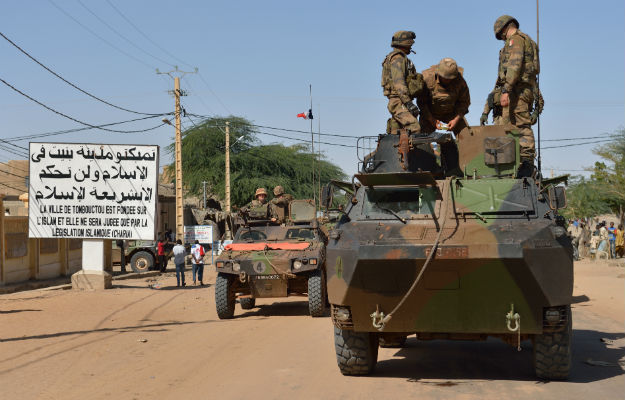
From Laura Seay, Foreign Policy: How is Mali different from Afghanistan? First, Mali is not where empires go to die. Afghanistan is well-known as a place that has always been difficult for any outsiders to invade and sustain military engagement, much less establish governing institutions. What governing institutions are established have long been weak and largely decentralized structures that allow local and tribal leaders maximum autonomy. Mali, by contrast, has a longer history of at least some centralized rule. The Mali Empire, which governed a huge swath of West Africa from the thirteenth to sixteenth centuries, included the renowned city of scholarship in Timbuktu. Mali’s colonization by France in 1892 was largely peaceful, and the country has never engaged in a serious war until now, with the exception of a brief and violent border dispute with Burkina Faso in the mid-1980s. France’s exit from Mali at the end of colonization was accomplished peacefully as well.
France’s engagement in Mali is also unlike U.S. engagement in Afghanistan in that, because of their colonial history, the French know what they are getting into. There are decades of outstanding French scholarship on Mali; France is practically drowning in Mali experts in government, academia, and the private sector. This is more important than many realize; having deep cultural and historical knowledge and a shared language (most educated Malians still speak French) makes it much easier for French forces to relate to average Malians and build friendships with key local leaders whose support will be necessary for long-term success.
Not surprisingly, French forces have been greeted by most Malians as liberators, with one citizen complimenting their desire to learn how to properly greet in the Bambara language in an interview with Reuters. In a country where extended and elaborate greeting rituals are a very important feature of communal life, knowing the importance of greeting others correctly is probably the single most important means by which French soldiers will win Malian hearts and minds.
Third, Mali is not Afghanistan because there are no Pashtuns. While the MNLA separatists are comprised of some members of the Tuareg ethic group, outside of that dynamic, ethnicity in Mali is much less a basis of contention than it is in Afghanistan. Indeed, the most interesting social dynamic in Mali may be the relationship between competing forms of Islamic devotion, not ethnic groups. Likewise, Mali lacks an equivalent to Pakistan — there is no neighboring state or individuals in that state who share militants’ ethnicity and have the backing of elements of a hostile spy agency. The Islamists who do operate in northern Mali are a disparate group with diffuse goals, as this series of posts by Sahel expert Andrew Lebovich make clear. Ansar Dine just split, and it is likely that the group dynamics of the Islamists will continue to evolve in the near future. This is not to say that ethnicity and other social cleavages do not matter in Mali; they do. But unlike in Afghanistan, they are not directly tied up in the dynamics of northern Mali’s Islamists. Many Islamist leaders in northern Mali aren’t even Malians.
Finally, the circumstances of French intervention in Mali are completely different from those of the U.S.-led intervention in Afghanistan. The French did not invade Mali; the Malian government asked them to come assist in repelling the Islamists. France also intervened with the clear expectation and understanding that the bulk of peace-building in Mali will be conducted by an African force, and that local and regional African leaders will have long term responsibility for the crisis. The French do not seem to have plans to stick around, build forward operating bases, and attempt to govern on their own terms. Furthermore, the stated goal of the French intervention is to rid northern Mali of Islamist militants rather than the more ambiguous goals of the U.S. "War on Terror." France laid out a measurable objective for fighting from the beginning. In this, the French seem determined to avoid the pitfalls of Afghanistan rather than replicating them.
That said, Mali’s future is far from certain. There are already signs that the MNLA are trying to reassert authority in northern Mali, which could lead to more violence in the weeks and months to come. Mali’s domestic politics are still far from settled; the junta that staged the coup that created this mess is still very much around and willing to intervene in politics, though their power seems to have diminished since the French arrived. Mali’s president has announced his intention to hold elections by July 31, but whether doing so will be logistically or politically possible remains anyone’s guess. The only thing that is clear is that America’s punditocracy will need to understand the crisis for some time to come. They might do well to call some actual Mali experts next time.
Laura Seay is assistant professor of political science at Morehouse College in Atlanta. (photo: Eric Feferberg/AFP/Getty)
Image: getty%201%2031%2013%20Mali.jpg
